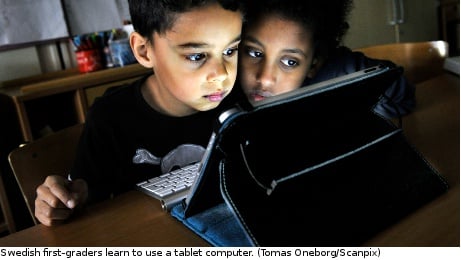The ranking was compiled by comparative education research institute Pearson for The Economist Intelligence unit.
It discusses at length society’s attitude towards education, saying the top two on the list – Finland followed by South Korea – value education highly.
“Glorifying near-illiterate celebs creates big problems,” said education specialist Chester Finn at Thomas Fordham Institute who is quoted in the report.
The report was released on the same day that Sweden’s Deputy Education Minister Nyamki Sabuni said it was time “to make performing in school and getting good grades cool”.
Sweden’s Finance Minister Anders Borg also dedicated a large portion of his presentation at Tuesday’s Nordic Bank Summit in Stockholm to education, saying Swedish children had to study more.
His government has introduced grades earlier in the Swedish compolsary education system.
The focus on valuing education expressed in Pearson report also featured in Borg’s speech.
“We are on the verge of a cultural shift. We have a new teacher training programme, and that starts now,” he told the Nordic Bank Summit audience.
Borg said the reforms will give more room for wage negotiations pegged to teaching quality.
“In the schools system, 40,000 kronor ($6,000) a month is considered a very high salary,” he told the audience.
Borg also said that trainee programmes need reform as young Swedes bear the brunt of unemployment.
He praised trainee programs in Austria and Germany, saying they made young people attractive on the job market.
“Nobody says ‘Let’s go to Germany because of the low youth wages!’ People chose to have their production in Germany because of the quality, because of the access to the best metal workers and the best engineers.”
Borg also expressed admiration for the study habits of children and teenagers in many Asian nations.
“The Chinese combine hard studying with real entrepreneurial spirit, which means we face a real challenge,” Borg said.
He dismissed the notion that countries such as China are at a competitive disadvantage because they do no foster creativity.
“Go to any China Town around the world and look at the entrepreneurial spirit,” Borg said.
Asked by The Local if he made a distinction between creativity and entrepreneurial spirit, he specified that creativity was part and parcel of the arts and research, while entrepreneurial spirit was linked to financial activity.
He said that on a recent trip to Asia a counterpart had praised Swedish after-school activities.
“He said ‘it’s so amazing that Swedish kids don’t do homework in the afternoons and are instead outside playing ball. I wish it was like that here’,” Borg said.
“I just thought, what is this man telling me? It’s obviously the other way around.”
The top 20 best countries for education based on, among other factors, international test scores and the proportion of students who graduate:
• Finland
• South Korea
• Hong Kong
• Japan
• Singapore
• UK
• Netherlands
• New Zealand
• Switzerland
• Canada
• Ireland
• Denmark
• Australia
• Poland
• Germany
• Belgium
• USA
• Hungary
• Slovakia
• Russia
Ann Törnkvist



 Please whitelist us to continue reading.
Please whitelist us to continue reading.
Member comments